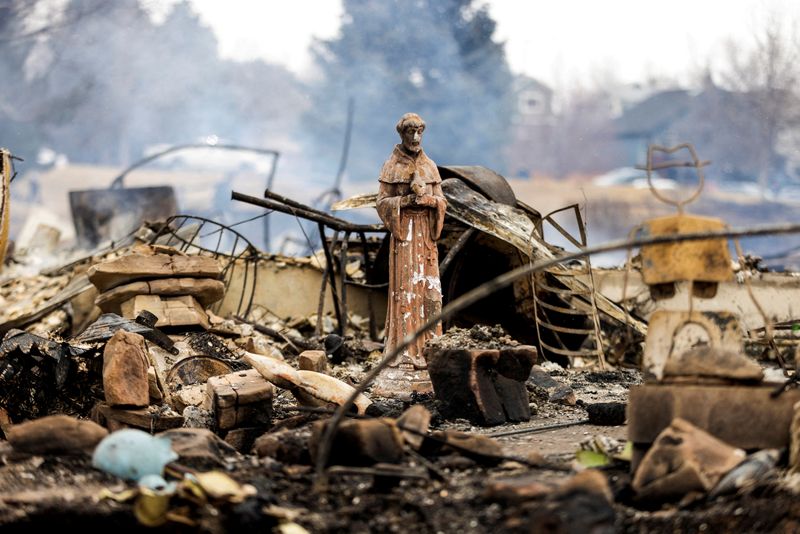By Keith Coffman
DENVER (Reuters) - Colorado's costliest wildfire on record started from fierce winds that damaged power lines and unearthed smoldering embers from a controlled burn days earlier, sparking two blazes that merged into a deadly conflagration, authorities said on Thursday.
Investigators found a variety of human and weather-related factors combined to spark the Marshall Fire, which killed two people and destroyed nearly 1,100 homes in December 2021, but ruled out any criminal culpability, the Boulder County Sheriff's Office said.
The sheriff's report was released as a group of two dozen homeowners and community members filed a lawsuit against Xcel Energy (NASDAQ:XEL), the utility whose wind-damaged power lines the sheriff's office cited as having contributed to the deadly fire.
The plaintiffs accused Xcel of negligence in failing to properly maintain its equipment.
The company issued a statement disputing the sheriff's office findings that sparks from arcing Xcel power lines caused a second ignition point of the Marshall Fire, which began on nearby private property of the Twelve Tribes religious sect.
"Xcel Energy did not have the opportunity to review and comment on the analysis relied on by the sheriff's office and believes those analyses are flawed and their conclusions incorrect," the company said.
The utility said flames from the second fire were not believed to have caused any property damage, and that in any case the second ignition point was at least 80 feet away from Xcel power lines in an area with underground coal fire activity.
But sheriff's investigators found no evidence that any underground combustion in the area's coal seams produced heat capable of starting a fire at the surface.
As for the first ignition source, sheriff's investigators traced its origin to an area where a controlled burning operation has been legally conducted on residential property of the Twelve Tribes just six days before and had been properly covered over with dirt. But high winds on Dec. 30, 2021 blew away loose soil, newly exposing the embers while they were still hot, the report found.

Property losses from the fire, which scorched more than 6,000 acres and laid waste to parts of two Boulder County towns on the northern outskirts of the Denver area, have been placed at $2 billion, ranking the blaze as the most costly in Colorado state history. President Biden visited the fire zone days later, saying the rare winter blaze marked the latest "code red" reminder of an ominously changing climate.
Both the sheriff's office and local prosecutors determined there was insufficient evidence of criminal conduct in connection with the blaze and determined that charges would be filed, the sheriff's statement said.